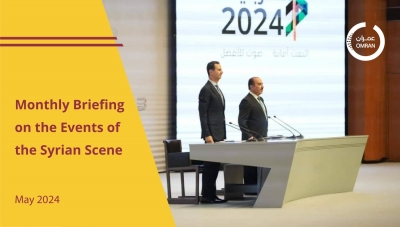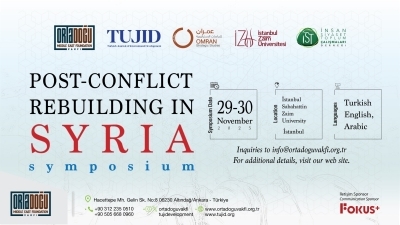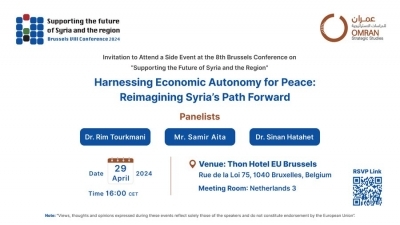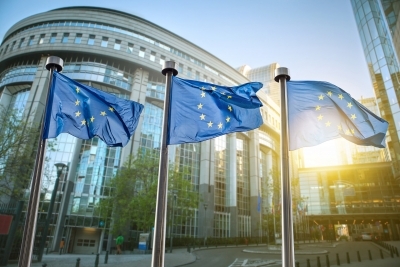General Summary
This report provides an overview of the key events in Syria during the month of May 2024, focusing on political, security, and economic developments. It examines the developments at different levels.
- Politically, the trajectory of Arab normalization with the Assad regime remains volatile. The Arab League summit's statement and the suspension of the Arab Contact Committee reveal a more cautious Arab stance towards opening up to the Assad regime. Meanwhile, diplomatic normalization appears more stable, evidenced by Saudi Arabia appointing an ambassador to Damascus.
- Security, instability persists across Syria due to the Iranian-Israeli proxy war on Syrian soil and the presence of various militias in regime-controlled areas, along with local actor conflicts and their unstable models.
- Economically, all regions in Syria are suffering from an economic crisis exacerbated by the decisions of controlling authorities, with attempts to boost investment in northern Syria.
The Path of Arab Normalization with the Assad Regime: Challenges and Limited Progress
The path of Arab normalization with the Assad regime faces significant difficulties and challenges that the intervening parties struggle to address. Notably, the Arab Liaison Committee's meeting, intended to communicate with the regime, was canceled after Damascus failed to respond to inquiries regarding Captagon smuggling and other issues. Additionally, a meeting between the regime's foreign minister and his Jordanian counterpart, Ayman Safadi, yielded no progress on the Arab Committee's requests.
Despite Bashar al-Assad's attendance at the regular Arab summit held in Bahrain, without a scheduled speech, the final statement emphasized the necessity of resolving the Syrian crisis in accordance with Resolution 2254. This includes the transition process, ensuring Syria's security, sovereignty, and territorial integrity, fulfilling the aspirations of its people, eradicating terrorism, and providing a dignified and safe environment for the voluntary return of refugees. Reflecting the limited Arab openness, the Assad regime ceded hosting the next summit to Iraq. These developments indicate a more cautious and deliberate Arab approach to normalization with the Assad regime, reassessing the implications of opening up further in light of growing concerns that additional incentives to Assad could yield counterproductive results.
Locally, within the context of formal structural changes initiated by the regime, Bashar al-Assad participated in the expanded meeting of the Central Committee of the Arab Socialist Baath Party. The meeting resulted in Assad's re-election as Secretary-General of the party and the election of 14 new members to the central leadership. Additionally, members of the party's Central Committee at the provincial level and the new Control and Inspection Committee were elected. However, these changes are merely organizational adjustments within the party's structure, aimed at recycling the regime's allies to maintain the Baath Party's control over Syria's political and social landscape. These steps do not seem to contribute to genuine reforms that could satisfy Syrian parties and lead to a comprehensive political solution.
In northeastern Syria, the Autonomous Administration is making efforts to fortify the home front ahead of the municipal elections scheduled for the first half of July. Mazloum Abdi, the commander-in-chief of the SDF, held a series of meetings with Arab tribal sheikhs and notables in Deir Ezzor, where he acknowledged mistakes made by his forces during the pursuit of ISIS elements and pledged to release detainees and compensate those affected. This coincides with the issuance of the Autonomous Administration law on administrative divisions in preparation for local elections. The announcement of these elections has sparked significant controversy locally, regionally, and internationally. The US State Department stated that the conditions for free and fair elections in northeastern Syria are not met, while Turkey considers these elections a threat to its territorial integrity and national security. Under the new Administrative Divisions Law, northeastern Syria is now considered a single region divided into seven main districts. These laws and procedures are part of the administration's attempts to gain legal legitimacy over the region and establish a new status quo for future negotiations with other conflict parties in Syria. Additionally, these steps send messages to achieve political and field gains, raising concerns about the social, political, and legal consequences for Syrians residing in areas under the administration's control and the future of Syria in general.
Escalating Security Challenges in Syria
The security dilemma in Syria continues to worsen, with the country serving as a battleground for the Iranian-Israeli conflict. Israeli aircraft have targeted sites of Iranian militias in southern Damascus, Daraa, and Qusayr in Homs province, as well as a building managed by the regime's security forces on the outskirts of Damascus. These raids resulted in the deaths of 11 militiamen, including Syrians and Lebanese. In contrast, the "Islamic Resistance in Iraq" of the Iranian Revolutionary Guards carried out seven attacks targeting Israeli military sites in the occupied Syrian Golan. Additionally, an explosive device detonated in Damascus' Mezzeh neighborhood, killing one-person, injuring others, and burning cars. This marks the second such explosion in the same area within two months. In southern Syria, assassinations and clashes persist. Two regime forces members were killed by explosive devices planted in their cars north of Daraa. The regime has launched repeated security campaigns in the province, ostensibly to pursue wanted individuals involved in targeted attacks. However, mutual targeting and assassinations continue, affecting regime forces and former opposition fighters. These security policies have failed to establish stability in southern Syria. Meanwhile, weekly demonstrations in as-Suwayda persist despite the regime's attempts to intimidate protesters by sending large military reinforcements.
In Idlib, popular protests against Hay'at Tahrir al-Sham (HTS) have escalated. HTS's attempts to peacefully contain these protests by promising reforms have failed. This month, HTS forcibly dispersed a sit-in in central Idlib, with security elements assaulting protesters with hands and batons. Abu Muhammad al-Julani, HTS's commander-in-chief, justified this action by stating that HTS had warned against any disruption to public interests and rules, considering most of the protesters' demands as already met. HTS's failure to end the protests peacefully has led to the use of force in an attempt to intimidate protesters, though they seek to avoid excessive violence to prevent expanding the protest area and gaining new supporters who have remained neutral.
In northeast Syria, Turkish artillery targeted several villages near the town of Tal Tamr in al-Hasaka countryside, and the shelling extended to villages in the countryside of Manbij city. In Deir Ezzor, the SDF conducted a security screening campaign in various areas and bombed several towns and villages west of the Euphrates River under the control of regime forces and Iranian militias, resulting in civilian injuries. Additionally, the SDF launched a security operation in the city of al-Busaira, east of Deir Ezzor, which led to the death of an Iraqi ISIS leader. The number of ISIS operations in the area has declined, coinciding with increased security measures and reinforced military checkpoints.
Attacks by tribal fighters on SDF headquarters and checkpoints in Deir Ezzor also decreased significantly during the second half of May 2024. This decrease followed heavy shelling by the SDF on villages and towns near the city of Mayadeen, believed to be a haven and staging point for tribal fighters. The SDF's strategy in dealing with tribal fighters appears to have two main approaches. Locally, the SDF is attempting to re-engage with Arab tribes by increasing the frequency of meetings between SDF leaders and tribal notables, providing incentives to tribal leaders, and promising to improve services in the region. From a security perspective, the SDF is pressuring pro-regime forces and tribal fighters by bombing their gathering places and launching operations south and west of the Euphrates to incite local populations against them and increase the regime's burden in containing these fighters.
Economic Empowerment Initiatives and Challenges in Northern Syria
To highlight new patterns of humanitarian intervention and opportunities for social and economic empowerment, Syrian, Arab, and international organizations held a conference aimed at enabling investment in northern Syria. The conference recommended forming working groups to visit UN and international donor organizations and establishing an economic empowerment fund.
In northeastern Syria, the Autonomous Administration raised fuel prices: the price of diesel for agriculture reached /1,050/ SYP, heating diesel reached /1,150/ SYP, and a jar of domestic gas rose to /153,000/ SYP. Additionally, the price of a bread bundle increased from /900/ to /1,400/ SYP after the price of flour sold from mills to ovens was raised in all regions of northern and eastern Syria. In Manbij, the People's Municipality completed the first phase of equipping the industrial city, the largest of its kind in northern and eastern Syria, which will include shops and factories for the food, wood, and metal industries. The Autonomous Administration also concluded a deal with the Assad regime, obliging the supply of half a million tons of wheat at /36/ US cents per kilogram, while the administration priced the purchase of wheat from local farmers at /31/ US cents per kilogram. This deal is expected to yield financial gains for both parties: the regime will acquire wheat without incurring supply and storage costs, and the Autonomous Administration will achieve a profit rate of at least /3/ cents per kilogram of wheat, securing funds to cover the salaries of its civil and military employees.
Meanwhile, the regime government raised fuel prices: gasoline octane 90 reached /12,500/ SYP per liter, octane 95 rose to /14,368/ SYP per liter, and free diesel reached /11,996/ SYP per liter. The Economic Committee of the Presidency of the Council of Ministers called for a tax of /$25/ per imported solar panel. The Ministry of Internal Trade imposed new taxes on imported items, including white sugar and solar panels. Prices of commodities, vegetables, and fruits in Damascus increased by /70%/ compared to the same period last year, yet the regime resumed exporting vegetables and fruits to Gulf countries. The decisions to raise fuel prices and increase taxes have driven up consumer goods prices amid low purchasing power and a deteriorating economic situation, with many families relying on cash transfers from relatives abroad to meet basic living needs.
At the 8th Brussels conference, donor countries pledged /€7.5/ billion in donations, grants, and loans: /$3.8/ billion for 2024 and /$1.3/ billion for 2025. However, concerns about potential funding cuts and reduced aid highlight the urgent need for actors in political, humanitarian, relief, and development sectors to address these challenges through policies focused on economic empowerment and developing response and recovery plans aligned with new challenges.




